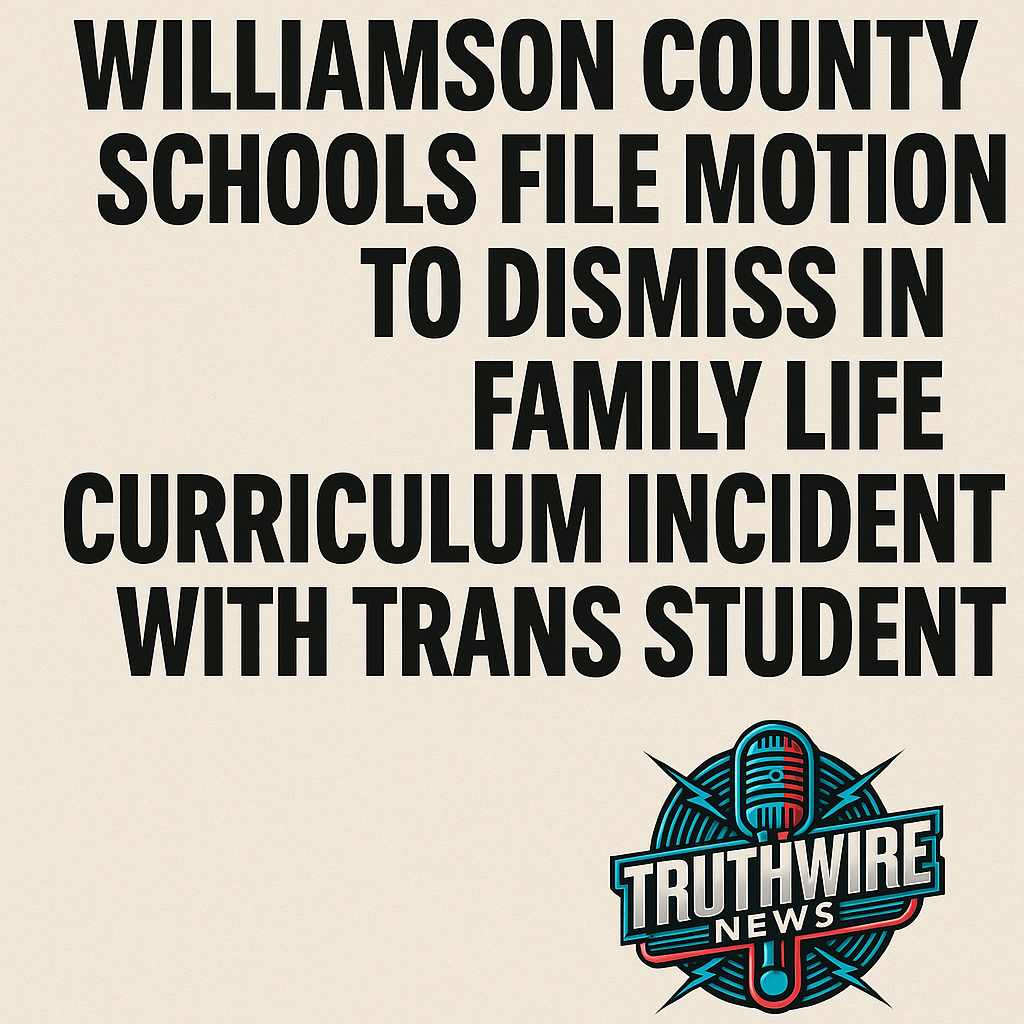Williamson County Schools wants the court to dismiss the case over a Family Life class that forced girls to choose between attending with a biological boy or opting out. Parents say the district’s “fix” doesn’t erase a clear violation of Tennessee law.
By Kelly Jackson
October 2025 – Franklin, Tennessee
Williamson County Schools has asked a chancery court to dismiss a lawsuit brought by parents of Legacy Middle School students who say their daughters were forced to choose between attending a “Family Life” class with a biological male student or opting out of the program altogether.
The case — filed earlier this year in Williamson County Chancery Court — centers on a May 2025 Family Life course at the county-run middle school. Despite instructions to separate students by sex, one biologically male student who identifies as female attended the girls’ session. Several parents objected, saying their daughters were placed in an impossible position: either share the classroom with a male student or withdraw from a state-mandated educational component.
The District’s Motion: “No Ongoing Controversy”
In filings submitted September 8, attorneys for the district and Legacy Middle principal Dr. Alicia Justice urged the court to throw out the lawsuit, arguing that the dispute is “moot” because the student in question no longer attends Williamson County Schools.
Their Motion to Dismiss, accompanied by a 21-page memorandum of law, contends that the issue “no longer involves a present, ongoing controversy.” The district argues that because the incident occurred last school year — and because administrators have since “acknowledged errors” and revised internal procedures — the matter no longer requires judicial action.
The filing also claims that the parents have not suffered an ongoing injury and that the lawsuit presents no “justiciable controversy” under Tennessee’s Declaratory Judgments Act. In short, the district is asking the court to rule that even if mistakes were made, those mistakes were corrected, and courts shouldn’t rule on hypothetical future harms.
The Legal Counterpoint: Why Parents Say Dismissal Is Premature
Attorneys for the parents argue that WCS’s motion misses the point — that this isn’t merely about a past mistake, but about whether the district’s actions violated clear Tennessee law and parental rights that remain in effect.
The parents’ filing contends that the case is “capable of repetition, yet evading review” — a well-recognized legal exception to mootness that allows courts to decide cases likely to recur but difficult to challenge before they end. In other words, just because the particular student left the district does not mean the unlawful conditions that created the incident have disappeared.
Representing the parents is State Representative Gino Bulso (R–Williamson County), who has taken an active role in both his professional capacity as an attorney and his legislative capacity as a state lawmaker to protect children in Tennessee’s public schools. Bulso, who represents the same district where the case originated, has been a consistent advocate for parental rights and for maintaining biologically based distinctions in education and student policy.
He and the parents argue that state statutes leave no room for administrative discretion once sex-separated programming is required by law. Because Family Life instruction is mandated and state law defines “sex” biologically, they maintain that the violation is ongoing as long as WCS policies remain ambiguous or unenforced.
Legal observers note that if the court sides with the parents, it could establish a clear precedent confirming that school systems cannot use “policy changes” or “student turnover” as grounds to avoid judicial scrutiny of past violations — especially those affecting minors and parental rights.
Superintendent’s Affidavit: Admitting “Errors,” Denying Violations
An attached affidavit from Superintendent Jason Golden offers the district’s most detailed account to date.
Golden confirms that:
• The district separates boys and girls for Family Life instruction at the middle school level.
• The biologically male student “was not directed to attend the class intended for females,” but administrators “did not intervene in a manner consistent with my expectations” once the issue was raised.
• Afterward, Golden and other district leaders acknowledged the mistake, noting that staff “failed to have an adequate plan in place” and “did not address the situation appropriately when it developed.”
Golden says he communicated with parents who had complained and assured them that new protocols would prevent a repeat of the incident. He maintains, however, that no law was violated, and that the issue was one of policy mismanagement — not illegality.
District “Fixes” Policy — Parents Say That’s Not Enough
In the affidavit, Golden outlines new district-wide procedures that now require principals to meet individually with parents and students who identify as a gender different from their biological sex before the Family Life curriculum begins.
Under the updated protocol, students will have only three options:
- Attend the class matching their biological sex;
- Request a private instructional session; or
- Opt out entirely.
Golden describes this change as a “corrective step” to ensure proper separation in the future.
But parents involved in the case argue that the district’s after-the-fact adjustments do not erase what already happened — nor do they satisfy state law. The suit seeks both declaratory and injunctive relief, asking the court to:
• Declare that allowing a biological male to attend the girls’ Family Life class violated Tennessee’s statutory definition of “sex” (T.C.A. § 1-3-105(c));
• Declare that allowing a biological male to use a girls’ restroom violated the Tennessee Accommodations for All Children Act (T.C.A. § 49-2-801 et seq.); and
• Bar the district from repeating these actions in the future.
Parents say their daughters’ right to privacy was breached and that they were effectively coerced into opting out of a required educational program because the school refused to uphold biological distinctions recognized under state law.
The 2025–2026 “Family Life” Notice: A New Attempt at Compliance
On October 3, 2025, Legacy Middle School sent a new letter to parents announcing this year’s Family Life curriculum schedule and procedures — signaling the district’s effort to show compliance and transparency ahead of the pending court hearing.
The letter, signed by Dr. Justice and the Golden Lion Team, outlined the following:
WCS staff will teach the state-required Family Life Curriculum for the 2025–26 school year in November. At Legacy Middle, the dates are November 5 and November 7.
The curriculum, taught by Mrs. Tansy Raynor, WCS Curriculum Specialist for PE/Health & Wellness, will cover:
- Human development and relationships (family, friends, and setting boundaries)
- The reproductive system (anatomy)
- Maintaining reproductive health (risk of sexual activity, taught from an abstinence perspective)
- Awareness and prevention of human trafficking
Parents may view the lessons in advance by contacting the front office, and they may opt their student out in writing by emailing school counselor Carrie Bidinger prior to the presentation dates.
The letter also specifies that students will be separated by birth gender and grade level:
- Female students will receive instruction on November 5
- Male students on November 7
The inclusion of the explicit phrase “separated by birth gender” marks a notable shift from last spring’s approach and may serve as evidence of the district’s claimed corrective action.
What the Law Says
The case rests on two key Tennessee statutes:
• T.C.A. § 1-3-105(c) defines “sex” in all Tennessee law as a person’s “immutable biological sex as determined by anatomy and genetics at the time of birth.”
• T.C.A. § 49-2-801 et seq., known as the Tennessee Accommodations for All Children Act, requires that multi-occupancy restrooms and changing facilities be designated by biological sex, while permitting single-occupancy options for those requesting privacy.
The district contends that neither statute was violated because the situation was inadvertent and promptly corrected. The plaintiffs argue the opposite — that the statutes leave no room for administrative discretion once a sex-separated program or facility is in place.
Standing and Mootness: The Core Dispute
The legal question before the court is whether the controversy is truly over or whether it represents a recurring problem that merits judicial review.
Williamson County Schools claims the matter is moot since the student left the district and new procedures have been implemented. The plaintiffs counter that the harm was real, the legal violations were clear, and the situation is “capable of repetition yet evading review.”
If the judge agrees with the parents, the case could continue as a test of how Tennessee courts interpret statutory definitions of sex and parental rights in public education.
But if the court sides with the district, the implications could extend far beyond Williamson County. A ruling that allows WCS to avoid accountability simply because a student left the system or because administrators claim “procedural error” would effectively send a message to districts across the state that statutory violations carry no real consequence. It would establish a dangerous precedent — one where public-school officials could expose students to harm, violate clearly written laws, and then erase their liability by labeling the event as an “oversight,” a “misunderstanding,” or the act of a single rogue administrator who disagreed with policy.
In legal terms, such an outcome would undermine the purpose of declaratory relief itself — which exists precisely to clarify the meaning and application of law when public officials overstep. By accepting “administrative error” as a defense, the court would be granting public entities a perpetual escape hatch: the ability to claim ignorance or internal disagreement as justification for conduct that directly contradicts Tennessee statute.
Parents’ attorneys argue that accountability cannot depend on whether a district later regrets its actions or reassigns personnel. The law either protects students’ privacy and parental rights or it doesn’t — and if those protections can be nullified by administrative disobedience, the legal safeguards written into Tennessee code become meaningless.
What Comes Next
The motion to dismiss will now be heard in Williamson County Chancery Court on November 18, 2025.
If the judge allows the case to proceed, the next phase would likely involve discovery, where internal communications, policy drafts, and emails related to Family Life programming and gender accommodations could become public record.
The outcome could have far-reaching implications, setting precedent for how Tennessee schools navigate the tension between biological sex definitions in state law, gender identity accommodations, and parental rights in public education.
For now, the question before the court is simple:
Did Williamson County Schools fix a problem — or try to make it disappear before anyone could hold them accountable?
If you support what we do, please consider donating a gift in order to sustain free, independent, and TRULY CONSERVATIVE media that is focused on Middle Tennessee and BEYOND!
COME TO OUR EVENT FOR A GREAT EVENING OF BBQ AND GRASSROOTS PATRIOTISM!! SCAN THE QR CODE, OR CLICK HERE!!





Comments ()